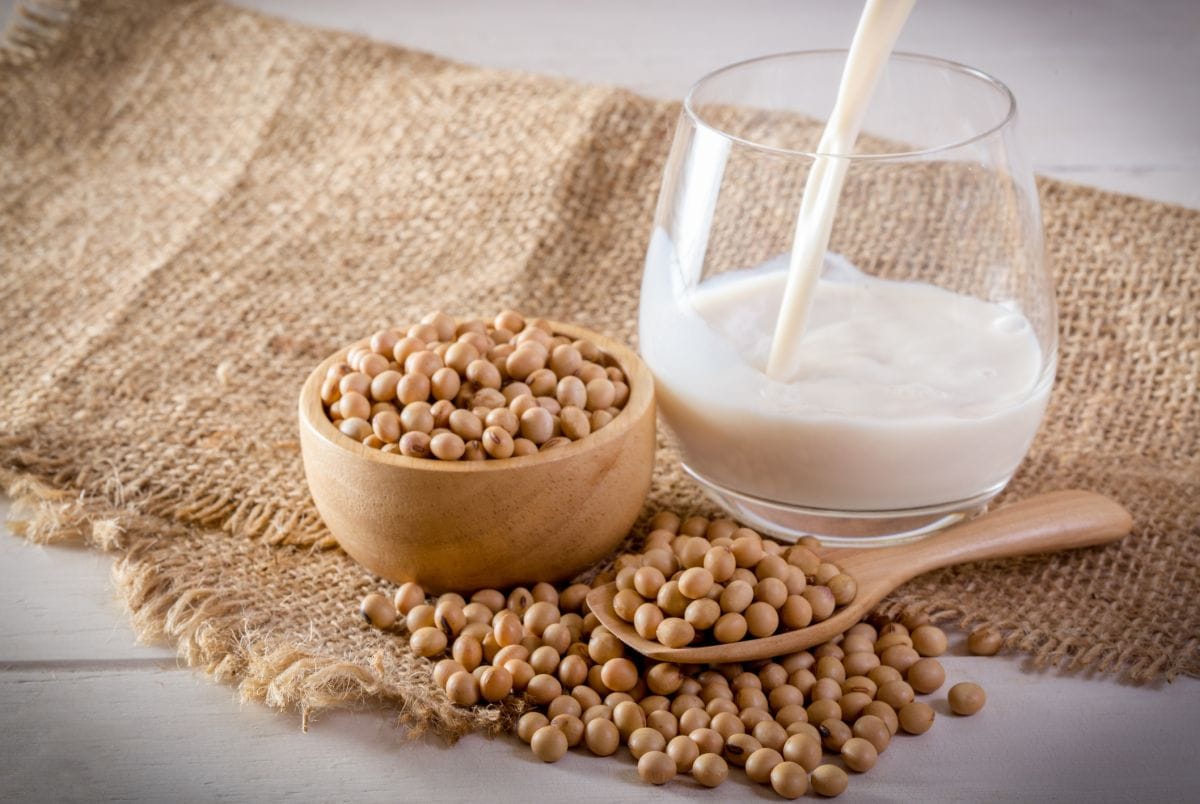Soy milk is a plant-based, dairy-free drink made from soybeans. It is popular among people who are lactose intolerant or have dairy allergies, and it has many health benefits.
Soy milk is high in protein, fiber, vitamins, and minerals. It has a light, nutty flavor and can be used in many recipes that call for milk.

What Is Soy Milk?
Soy milk is made from soybeans, which are soaked, ground up, then mixed with water. This mixture is boiled until it thickens then strained to produce a liquid similar to cow's milk. It has a similar consistency to cow's milk, but it does not contain any dairy products. Soy milk provides many nutrients, and it can be used in place of cow's milk for most purposes.
You can enjoy soy milk on its own or use it in cooking or baking, much like regular milk. For people who cannot tolerate lactose or don't like the taste of dairy products, soy milk can be an excellent choice for adding protein and nutrients to their diet.
Some varieties of soy milk may be fortified with vitamins or minerals to increase their nutritional value. And some manufacturers may add flavorings or sweeteners before packaging the finished product for sale.
Soy Milk Nutrition
According to the USDA, one cup of unsweetened soy milk has the following nutrition. Check the nutrition label of any product you plan to buy to get its accurate nutrition information.
- Soy milk calories
One cup of unsweetened soy milk has 98 calories. This is about the same amount as one cup of low-fat (1%) cow's milk, which has 105 calories.
- Soy milk protein
Soy milk has 7 grams of protein per cup, which is close to the 8 grams in low-fat milk.
- Carbs in soy milk
Unsweetened soy milk is a little lower in carbohydrates than low-fat cow's milk. One cup of soy milk has 7 grams of carbohydrates versus 13 grams in dairy milk. But soy milk has about 2 grams of dietary fiber while cow's milk has none.
- Fat in soy milk
One cup of soy milk has 5 grams of total fat compared to 2 grams in low-fat milk.
- Soy milk calcium
Both soy milk and cow's milk are excellent sources of calcium: 372 mg per cup in soy milk and 307 mg per cup in cow's milk.
Is Soy Milk Good for You?
Yes, soy milk is good for you. The nutrition of soy milk is the most similar to cow's milk of all the non-dairy milk alternatives.
One of the main advantages of soy milk over other non-dairy milks is that it contains high amounts of protein. Protein is essential for building and maintaining muscles and other body tissues. Soybeans are known to be one of the best sources of plant-based protein available.
Fortified soy milk is an excellent source of calcium and vitamin D. Calcium and vitamin D help build strong bones and teeth, prevent osteoporosis, improve immune function and heart health, enhance muscle contractions, improve nerve transmission, and promote general good health.
Soy milk is also a good source of several other vitamins and minerals that are essential for many processes in the body.
Soy Milk Vs Almond Milk
Soy milk and almond milk are two of the most popular non-dairy milk alternatives. Both are plant-based products, but they offer some different benefits.
One cup of fortified unsweetened almond milk has 37 calories compared to 98 calories in unsweetened soy milk. If you are trying to lose weight, almond milk is the better choice. Almond milk also provides more calcium than soy milk although both milks are good calcium sources. Almond milk also contains vitamin E which prevents cellular damage due to free radicals while soy milk does not have this.
But almond milk only has 1 gram of protein per cup compared to 7 grams in soy milk. So drinking almond milk is not a good way to meet your protein needs. Soy milk also has fiber but almond milk does not.
Soy Milk FAQs
Soy milk does not contain dairy products, so it's dairy free. It is a plant-based alternative to cow’s milk and is often used in place of dairy products.
No, soy milk is lactose free. It's made from soybeans and does not have any lactose in it.
Yes, soy milk is safe to eat for vegans and vegetarians. It is made from soybeans and does not contain any animal products or by-products.
Bottom Line
Soy milk is a nutritious and versatile plant-based alternative to dairy milk. It contains high amounts of protein, calcium, vitamin D, and other vitamins and minerals that are important for good health. Soy milk is an excellent choice if you are vegan, lactose intolerant, or wanting to add a new healthy food to meet your nutritional needs.


